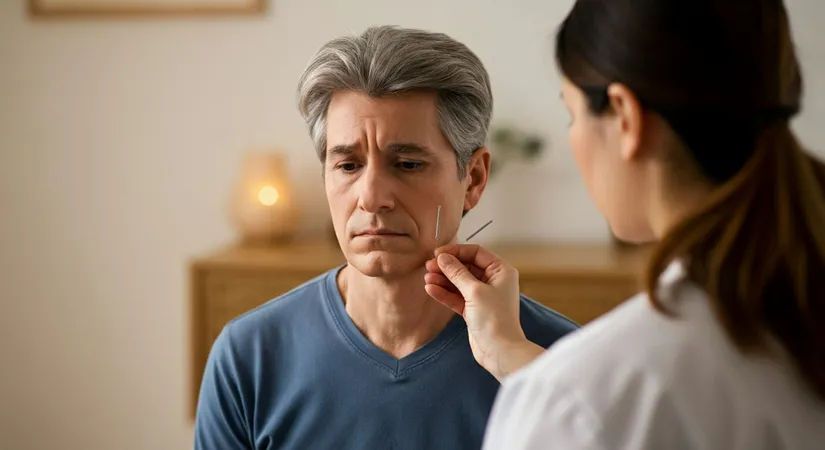Acupuncture Benefits: Understanding How It Works for Pain Relief
Experience the ancient art of acupuncture, a powerful tool for holistic health. Discover its benefits for pain relief and mental wellness.
Acupuncture, an age-old therapeutic practice, offers a myriad of benefits for holistic healing. This ancient form of Traditional Chinese Medicine (TCM) addresses various health issues by balancing the body's energy flow, known as "Qi". From alleviating chronic pain to reducing stress and anxiety, acupuncture is gaining popularity as a holistic approach to enhancing well-being. In this blog, we delve into how acupuncture works and its profound impact on physical and mental health.
How Does Acupuncture Work for Pain Relief?
The Science Behind Acupuncture's Analgesic Effects
Acupuncture therapy involves inserting thin needles into specific points on the body, known as acupuncture points, to stimulate nerve-rich areas. This stimulation triggers the release of endorphins, the body's natural painkillers, which help in reducing pain sensations.
Key Benefits of Acupuncture for Pain Management
- Acupuncture benefits include reducing reliance on pharmaceuticals, offering a holistic healing approach.
- It is effective for chronic conditions like migraines and arthritis, providing long-term relief.
- Traditional Chinese Medicine principles support its use for stress and anxiety, enhancing overall well-being.
Steps in an Acupuncture Session
- Initial consultation to assess the patient's condition and determine appropriate acupuncture points.
- Insertion of needles at specific points to stimulate nerve pathways and promote healing.
- Monitoring and adjusting treatment based on patient feedback and response to therapy.

Exploring Acupuncture Therapy for Anxiety and Stress
Mechanisms of Acupuncture in Stress Reduction
Acupuncture therapy is renowned for its ability to alleviate anxiety and stress by modulating the nervous system. This ancient practice reduces stress hormones like cortisol, promoting a state of relaxation through the release of endorphins.
Unique Benefits of Acupuncture for Mental Well-being
- Acupuncture benefits include enhancing mood stability by balancing neurotransmitter levels.
- It offers a holistic healing approach, integrating mind and body wellness.
- Traditional Chinese Medicine principles support its use for emotional balance, reducing anxiety symptoms.
Steps in an Acupuncture Session for Stress Relief
- Initial assessment to identify stress triggers and select appropriate acupuncture points.
- Needle insertion to stimulate relaxation pathways and reduce tension.
- Ongoing evaluation to adjust treatment based on stress reduction outcomes.

Acupuncture Points for Headaches: A Comprehensive Guide
Targeting Key Acupuncture Points for Effective Headache Relief
Acupuncture therapy targets specific points to alleviate headaches, focusing on areas like the temple, neck, and hands. By applying precise pressure, acupuncture enhances blood flow and reduces inflammation, effectively relieving tension headaches and migraines.
- Temple points help alleviate migraine symptoms by improving circulation in the head.
- Neck points reduce tension, addressing stress-related headaches.
- Hand points, such as the LI4, are known for their pain-relieving properties.
Understanding the Process of Acupuncture for Headache Relief
- Initial assessment to identify headache type and select appropriate acupuncture points.
- Precise needle insertion to stimulate targeted areas and promote healing.
- Continuous monitoring to adjust treatment based on patient response and symptom relief.
Traditional Chinese Medicine: The Foundation of Acupuncture
The Role of Qi in Holistic Healing
Traditional Chinese Medicine (TCM) emphasizes the balance of Qi, the vital energy flowing through the body. This balance is crucial for maintaining health and preventing disease. Acupuncture therapy, a key component of TCM, aims to restore Qi balance by stimulating specific points along the body's meridians.
- Acupuncture benefits include improved energy flow, enhancing overall vitality and well-being.
- It supports the body's natural healing processes, promoting holistic healing.
- Acupuncture for stress and anxiety is effective due to its ability to harmonize Qi.
Understanding the Meridians and Acupuncture Points
Meridians are pathways through which Qi flows, connecting different parts of the body. There are twelve primary meridians, each associated with specific organs and functions. Acupuncture points, located along these meridians, are targeted to influence the flow of Qi and address various health issues.
- Identify the meridian related to the patient's symptoms.
- Select acupuncture points that will best restore Qi balance.
- Apply acupuncture therapy to stimulate these points and promote healing.
By understanding and utilizing the principles of TCM, acupuncture offers a comprehensive approach to health, addressing both physical and emotional well-being through the balance of Qi.
Acupuncture: A Holistic Approach to Pain and Stress Management
Comprehensive Acupuncture Sessions for Optimal Health Outcomes
Frequently Asked Questions
What are the primary benefits of acupuncture therapy?
How does acupuncture provide pain relief?
Can acupuncture help with stress and anxiety?
What is the role of Traditional Chinese Medicine in acupuncture?
What should I expect during an acupuncture session?
Discover the path to 'Healthy Beauty' with estethica's expert care. Call now for your free consultation and take the first step towards a more confident you!
📞 Schedule Your Free Consultation Today!